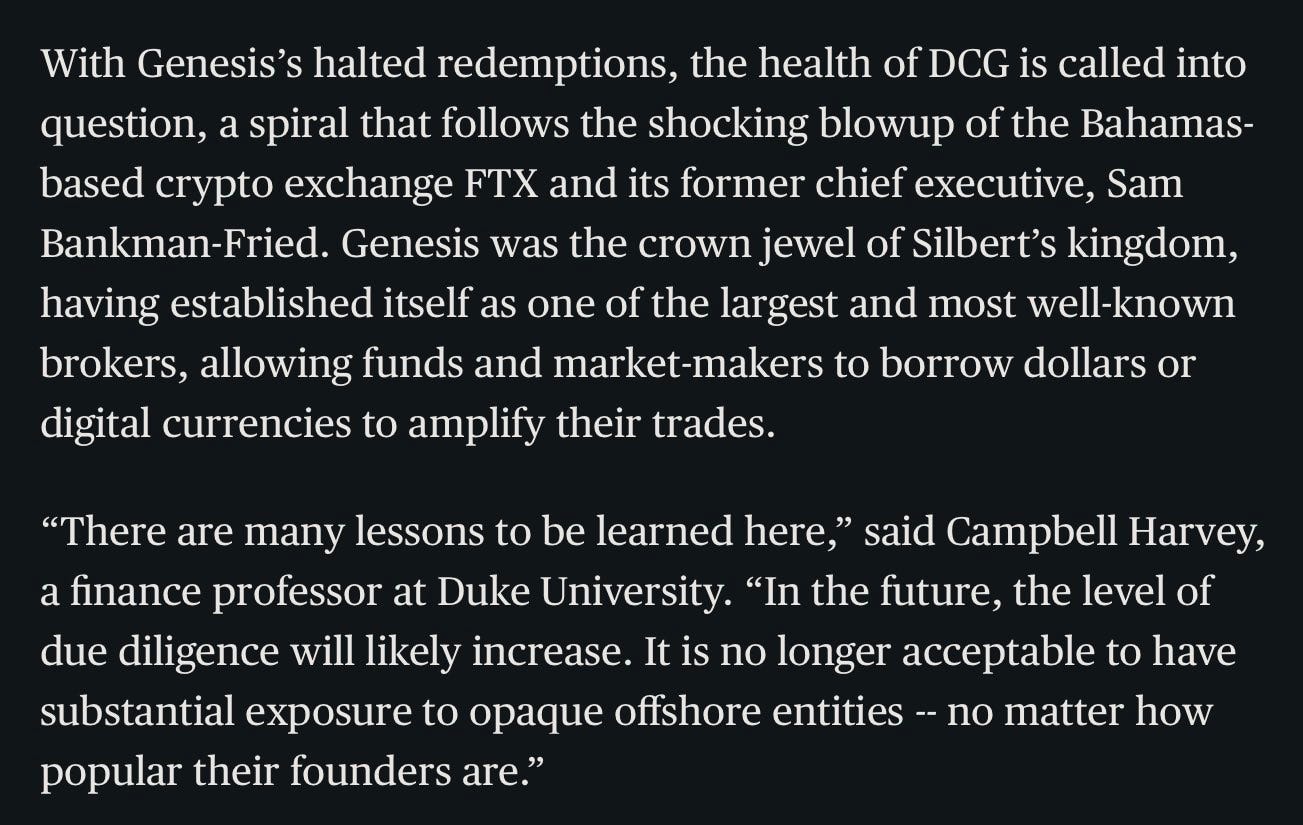Myth of Money: House of Cards - Which Crypto Firms Got Hit The Most?
Welcome to this week’s edition of Myth of Money, a weekly newsletter on the digital asset markets read by 12,000+ investors.
Disclaimer: The following is not intended as investment advice. Do your research.
Dear Investors,
The collapse of Luna and subsequently FTX has initiated a ripple effect through the entire industry. And the next victim appears to be Genesis, who halted withdrawals for clients this week.

Genesis, a part of Barry Silbert’s holding company (DCG), was the first OTC bitcoin desk far back in 2013. Genesis has grown beyond OTC and into crypto’s largest lending desk.
Today, Genesis moves some of the largest volumes across crypto in loan originations.
Genesis first encountered issues as a result of the LUNA collapse, triggered by a default by Three Arrows Capital (3AC). Genesis was the biggest creditor to 3AC to the tune of $2.4B. When 3AC filed for bankruptcy, Genesis, in turn, filed a $1.2B claim against the fund. The parent company, Digital Current Group (DCG), stepped in and assumed the claim leaving Genesis with no outstanding claims against the now-insolvent 3AC, but DCG continued to feel that loss on its balance sheet.
Genesis was hit again when it couldn’t collect its loans back from the collapsed Babel Finance. Several key personnel resigned from Genesis during this time.
The Domino Effect
In Q3 of 2022, Genesis transaction volume fell rapidly due to market conditions.
Genesis was holding deposits for several CeFi platforms, Venture Capital firms and high net-worth individuals. Platforms like Gemini and BlockFi, in particular, were heavily linked to Genesis. These platforms offered yield generation for clients who would deposit customer funds, and in turn, provide yield. These yields were used to settle the clients whilst also making a profit.
Gemini was forced to halt withdrawals this week as the liquidity of Genesis came into question.


This scheme only works if counter-parties that Genesis lends to can repay their loans. In this case, multiple funds who borrowed from Genesis have defaulted on their loans due to the FTX collapse.
Genesis halting withdrawals means CeFi platforms cannot only pay the yield but also cannot repay the principal to their clients. And so, the dominos continue to fall.
What Happens Now?
It is crucial for the survival of our industry for Genesis to be stabilized as soon as possible. Parent company DCG injected $150M into Genesis last week. Currently, both the parent company (DCG) and Genesis are scrambling to raise more capital. The last raise was $10B in November 2021.
Other Crypto Platforms Affected by FTX Include -
Galaxy Digital
Blockchain financial services company Galaxy Digital recently disclosed its $76.8-million exposure to FTX. Within the amount, the firm highlighted that $47.5 million is already in the process of being withdrawn. Despite the exposure, the company highlighted that it still has $1.5 billion in liquidity. This includes $1 billion worth of cash and $235.8 million in stablecoins, which can cover its losses.
Sequoia Capital
In a letter addressed to its limited partners, venture capital company Sequoia Capital announced that its $213.5-million investment in companies FTX and FTX US is now worth $0. The firm admitted that the FTX debacle spurred a solvency risk. Despite this, the venture capital firm claimed that its exposure is limited and offset by its gains.
Galois Capital
Hedge fund Galois Capital admitted in a letter to investors (obtained by the Financial Times), that the firm reportedly has half of its capital still stuck on FTX. The amount is estimated to be around $100 million, based on the firm’s assets under management as of June.
Crypto.com
Kris Marszalek, CEO of exchange Crypto.com, recently assured his customers that $1 billion worth of assets on FTX was fully recovered. The CEO highlighted that the remining exposure to the firm is only under $10 million. Marszalek also told users that the exchange will not be halting withdrawals and denied allegations of using the exchange’s native token as collateral for its loans.
Wintermute
Crypto market maker Wintermute made headlines recently after losing $160 million in a hack and has also admitted that it had some of its remaining funds on FTX.

Multicoin Capital
Investment firm Multicoin Capital reportedly has around $863 million in assets frozen on FTX. In a letter reported by The Block, the firm highlighted that it has 10% of assets under management within its Master Fund that’s stuck on the exchange.
CoinShares
Digital asset trading group CoinShares also disclosed its limited exposure to FTX in an announcement posted on Twitter. The firm noted that it was able to reduce its overall exposure to $31.5 million and assured its community that the firm’s financial state remains strong.

Amber Group
Financial services firm Amber Group has announced that it has been an active trading participant on the FTX exchange and has withdrawals yet to be processed. Despite this, the company stated in an announcement that the exposure is only limited to less than 10% of its total trading capital. The firm assured the community that the amount does not threaten its liquidity or its operations.
Pantera Capital
In a blog post, investment firm Pantera Capital noted that it had suffered some risks and losses from the FTX collapse. This came from the firm’s Blockfolio acquisition, which was done in FTT Token and FTX stock. According to the announcement, the firm liquidated as much FTT as it could on Nov. 8.
Nexo
While crypto lender Nexo admitted to having a small loan to Alameda Research, the firm highlighted that the amount was less than 0.5% of its total assets. The loan was fully collateralized by digital assets and was sold according to an announcement. The firm was also able to dodge a potential $219 million loss by withdrawing its entire balance from the FTX exchange.
This Week By the Numbers 📈
Top Stories 🗞️
Amazon Plans to Cut 10,000 Jobs in Largest-Ever Layoffs for E-Commerce Giant
Amazon.com Inc plans to cut about 10,000 jobs, the largest ever headcount reduction at the e-commerce giant as it braces for slower growth and a possible recession. The layoffs, which could begin as soon as this week, will likely target Amazon’s devices group, responsible for the Echo smart speakers and Alexa digital assistant, as well as Amazon’s retail divisions and human resources, according to people familiar with the matter. Teams are making the decisions on where to reduce headcount as part of the company’s annual planning process, said the people, who requested anonymity to discuss a confidential matter. Some longtime Amazon employees, also speaking on condition of anonymity to discuss an internal matter, said the cost-cutting in the last few months has been the most severe they’ve ever experienced. The shares were down about 1.4% in New York. The New York Times earlier reported the planned layoffs.
Multicoin Capital Reportedly Lost Close to a Billion Dollars on FTX
The FTX contagion is spreading wide and fast! On Thursday, November 17, crypto venture giant Multicoin Capital told its investors that the FTX collapse has pushed the fund down by a staggering 55% over the last month. Multicoin believes that there’s a possibility of recovering some of its assets from FTX in the future. However, since FTX is currently wrapped up in bankruptcy proceedings, Multicoin Capital prefers to write them down to zero. The crypto venture firm didn’t mention exactly what amount it is writing off due to FTX collapse. But market experts believe that this could be above $850 million dollars. Multicoin managing partners Kyle Samani and Tushar Jain wrote: “We put too much trust in our relationship with FTX. We had too many assets on FTX.”
Masayoshi Son owes $4.7bn to SoftBank following tech rout
Masayoshi Son personally owes SoftBank close to $5 billion (€4.8 billion) because of growing losses on the Japanese conglomerate’s technology bets, which have also rendered the value of his stake in the group’s second Vision Fund worthless. The billionaire’s ballooning personal liabilities, discovered through an analysis of SoftBank’s recent filings, comes as the world’s biggest tech investor was hammered by plunging tech stocks and valuations in private companies over the past year. The 65-year-old chief executive and founder of SoftBank last week said he would step back from running day-to-day operations at the group.
After Elon Musk's ultimatum, Twitter employees start exiting
Hundreds of Twitter Inc employees are estimated to have decided to quit the beleaguered social media company following a Thursday deadline from new owner Elon Musk that staffers sign up for "long hours at high intensity," or leave. The departures highlight the reluctance of some of Twitter's 3,000 or so employees to remain at a company where Musk earlier fired half of the workforce including top management, and is ruthlessly changing the culture to emphasize long hours and an intense pace. Musk took to Twitter late on Thursday and said that he was not worried about resignations as "the best people are staying." The billionaire owner also added: "We just hit another all-time high in Twitter usage...," without elaborating. Musk met some top employees on Thursday to try to convince them to stay, said one current employee and a recently departed employee who is in touch with Twitter colleagues.
Elizabeth Holmes Sentenced to 11 Years for Theranos Fraud
Elizabeth Holmes was ordered to spend more than 11 years in prison for fraudulently building her blood-testing startup Theranos Inc. into a $9 billion company that collapsed in scandal. The sentence imposed Friday by US District Judge Edward Davila in San Jose, California, is far closer to the 15-year term prosecutors asked for than what Holmes’s lawyers sought -- home detention or 18 months in prison at most. The sentencing caps a years-long saga that has riveted Silicon Valley, inspiring books, TV documentaries, podcasts, and films about the Stanford University dropout who became a celebrity entrepreneur, only to see her company crash when its technology was exposed as a failure. The government proposed that Holmes be ordered to pay $800 million to investors who lost money in Theranos, while Davila calculated the losses attributed to Holmes’s fraud at $121 million. Her lawyers have said she has “essentially no assets.” A pre-sentencing report by the government’s probation office said her “modest assets” are outweighed by $450,000 in loans for her civil settlement with securities regulators and more than $30 million in liabilities for legal fees.
Thank you for reading this week’s edition of the Myth of Money.🚀
Until next week,
Tatiana Koffman
By Tatiana Koffman
Hi there and thanks for reading. If you stumble upon my newsletter, you will notice that I write about money, economics, and technology. I hold a JD/MBA and spent my career in Capital Markets working across Mergers & Acquisitions, Derivatives, Venture Capital, and Cryptocurrencies. I believe in empowerment closing the financial education gap and creating equal opportunity for the next generation. I have invested in 20+ companies and funds. Check out my portfolio here.
Enjoyed your reading experience?
Follow me on Twitter.
Hit reply with your feedback and ideas :)
Share this post with others.
Disclaimer: This email does not contain financial advice and was created solely for informational purposes.
Received this email by accident? Unsubscribe below.







